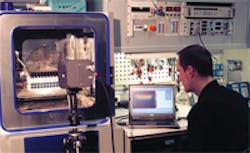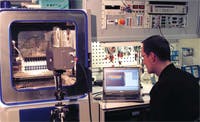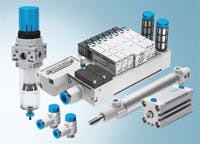Line of Technopolymer Products Targets Low-Cost Market
Festo Corp., Hauppauge, N. Y., recently introduced a range of products for high-volume industrial control applications, where price coupled with performance is key. The new product line includes air preparation units, compact and ISO cylinders, one-way flow control valves, a series of solenoid-operated valves, and valve terminals.
Festo’s new DSNUP series of pneumatic cylinders, for example, features technopolymer end caps, stainless steel piston rods, and aluminum barrels. They have a list price that is some 30% lower than their interchangeable all-metal DSNU counterparts. Available with piston diameters of 16, 20, and 25 mm, the DSNUP cylinders feature ISO swivel mounting and threaded end and bearing caps to greatly simplify installation. A compact cylinder with technopolymer end caps incorporates push-in tube fittings. It is known as the ADNP and costs 20% less than its equivalent all-metal version.
The cylinders are intended for simple automation tasks such as controlling gates and flaps, and for simple clamping and holding functions. Their high chemical compatibility makes them suitable for food processing and packaging applications, and their low weight should prove advantageous to OEMs automating handling operations.
A series of technopolymer- based valves is also available as individual components, and fully assembled and tested valve manifolds. The new VB12 valves feature a body molded entirely from IXEF 1022 glass-filled polyamide, resulting in a cost-effective, low weight design. Complementing the existing 20-mm wide bodied range, the valves accommodate air flows from 200 to 1000 lpm.
Festo performed extensive analysis of the valves to determine the optimum design — it was important that the chosen technopolymer provided a similar modulus of rigidity to metal, to ensure good leakage values and to prevent any misalignment of embedded contacts. This included forensic materials science techniques using dynamic x-ray analysis. Detailed thermal analysis — using worst-case scenarios of overdriven co-located solenoids and elevated ambient temperatures — has confirmed that the valves provide 100% reliability at ambient temperatures as high as 50° C.
A break from convention
According to Festo’s Steve Sands, “The shape of pneumatics technology is changing. ‘Fit for purpose’ has been spoken about for a long time, but as credit and cost squeezes continue, the focus is becoming clear. The industry is becoming increasingly polarized by the demand for higher technology or highly adapted products at one end, and basic low-cost products at the other. And despite the obvious sales potential for low-cost products, this isn’t Festo’s traditional strength, and we have not entered this segment of the industry lightly.
“Festo has conducted a rigorous materials R&D program to develop the necessary computer-based modeling and analysis tools to ensure that we can utilize the right materials in the optimum way. We now consider it technically and commercially viable to replace more metal parts in pneumatic valves and cylinders with injection molded components. The use of polymer materials achieves only a part of the potential savings; equally important are the ongoing innovations in manufacturing, assembly and logistic processes to help hone down the total production costs.”
Festo products are available in the U. S. from Festo Corp., Hauppauge, N. Y. For more information, call (800) 993-3786.
|
What are technopolymers? Festo’s materials development program has looked closely at ensuring thermal coefficient of expansion compatibility between components, such as between aluminum and the selected technopolymers. A further extensive study area has been compact solenoid valve assemblies, allowing for or eliminating hot spots, and taking into account all mounting configurations and ambient conditions. Finished technopolymer parts exhibit very high strength and rigidity combined with high dimensional stability, high surface quality and gloss, and excellent creep resistance under high stress. This combination of attributes makes the material an excellent replacement for metal; it has a tensile strength of 260 MPa (at 50% RH), which is about same as mild steel, and a coefficient of thermal expansion of 15 10-6 K-1. And unlike metal, it also has the advantage of being a good electrical insulator with high resistance to degradation from a wide variety of chemicals. |
About the Author
Nicola Meadway Festo Ltd. Fleet
Hampshire

Leaders relevant to this article:


